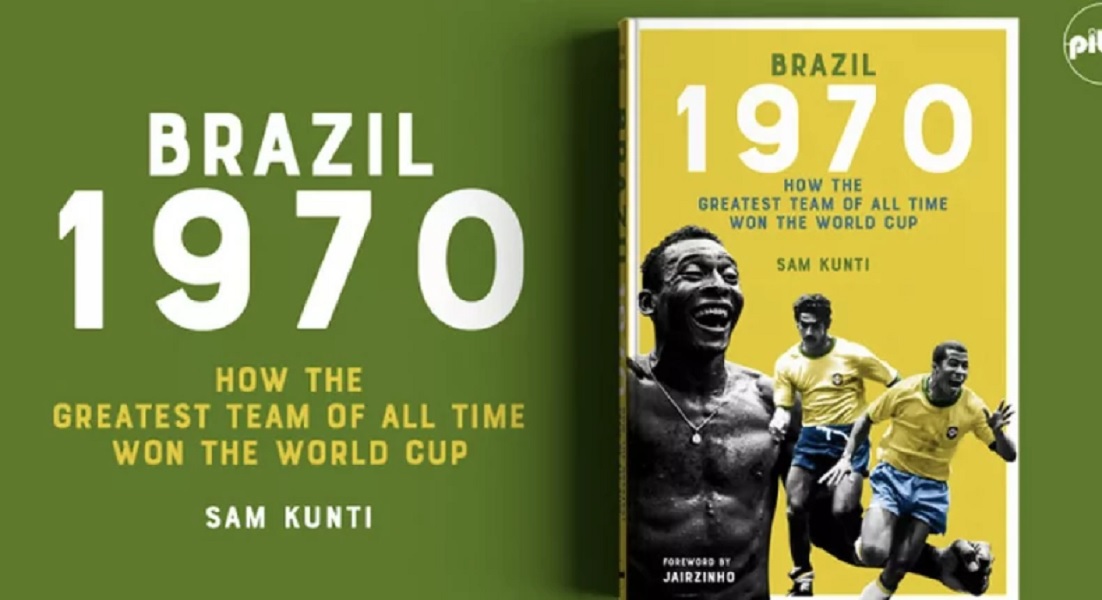Set on the triumphant story of one of football’s most celebrated teams, “Brazil 1970: How the greatest team of all time won the World Cup,” by Samindra Kunti, chronicles how the Selecao’s golden generation recovered from their disastrous showing in 1966 to become world champions…
It must be said that the world may never see a team as good as the Brazil side of 1970.
Built around the strong fists of Felix, the rear authority of Carlos Alberto Torres, Brito and Wilson Piazza, the genius and power of Clodoaldo, and the elegance and style of the attacking quintet of Jairzinho, Pele, Gerson, Tostao and Rivelino, the South Americans bested every opponent on their way to winning the World Cup in Mexico.
In the last five decades, so much has been said about how good the Selecao were but, literarily, no work, past or present, does justice to chronicling the team’s journey than Samindra Kunti’s latest book titled “Brazil 1970: How the greatest team of all time won the World Cup.”
A foreword by the adored Jairzinho certainly sets the tone for reading delight. Personally, I love a book that has its author deeply embedded in its pages and, in “Brazil 1970,” Kunti does that perfectly by highlighting in the prologue how he chased various interviews, his encounters with the players involved in the story he’s telling, his travels to different countries, and so on.
Written in 18 chapters, the book provides a contextual analysis of how Brazil’s golden generation romped to the Jules Rimet Trophy for keeps after winning the World Cup three times in 1958, 1962 and 1970.
The story stretches from 1963 to 1974 and captures Brazil’s low and high moments before and after their second World Cup triumph and the power struggle over the national team that followed.
To drop a few spoilers, it also details the ‘communist’ Joao Saldanha’s tempestuous coaching reign, his eventual exit after guiding the team to qualify for the World Cup, and the transformation that was wrought by his successor Mario Lobo Zagallo.
Page by page, you’ll get to know about the science behind Brazil’s golden generation and its decline after 1970. Most often, the phrase “inside story” is abused by writers but, trust me, this book lays it all bare from Brazil’s European money tour in 1963 to the team’s three most matches against England, Uruguay and Italy at the 1970 World Cup.
The intricacies of the game against England – which pitted the immediate former champions and defending champions at the time – take prominence in some pages, with both teams’ preparation, training, adaptation to the altitude in Mexico; how, despite relegating player welfare, the lunchtime kick-off benefited FIFA’s revenue stream from primetime TV broadcasts in Europe, and the Selecao’s eventual 1-0 victory over the English.
The book wraps up with Pele’s farewell in 1971. The best part is that it was not written on hearsay or accounts of just anyone, but backed by interviews with members of Brazil’s 1970 team.
I have very little criticism of this book, considering how far and wide its scope stretches and the substance of the people interviewed for its content, however, I feel more pages could’ve been dedicated to the individual players who contributed to Brazil’s triumph over just a selected few.
That said, Kunti did great work by covering every aspect of the team on their way to making history.
My Rating: 9/10
“Brazil 1970 – How the greatest team of all time won the World Cup” is available now on Amazon.
Source: PulseGhana

